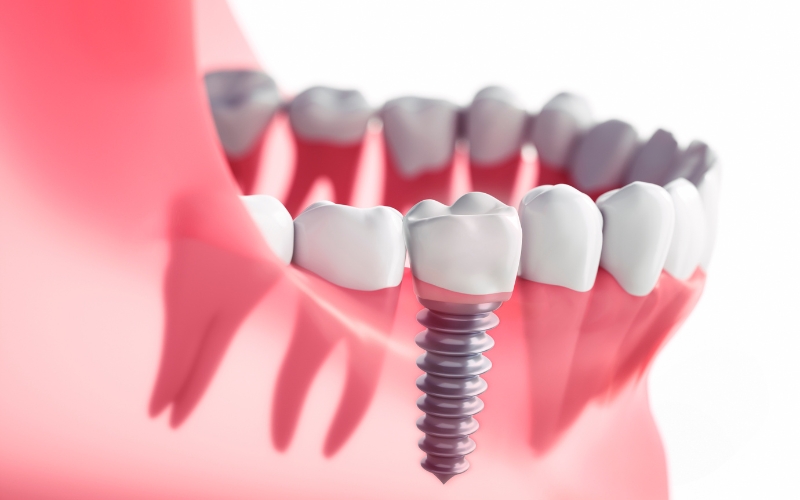Dental implants have revolutionized dentistry, offering a long-term solution for replacing missing teeth. Whether you’ve recently undergone a dental implant procedure or are considering one, it’s essential to understand the factors that determine their lifespan.
In this blog, we will delve into the average lifespan of dental implants, the various factors influencing their longevity, and provide valuable tips to help you extend the lifespan of your implants.
Average Lifespan of Implants
The goal of implants is to provide a long-term tooth replacement solution. On average, dental implants can last anywhere from 20 to 25 years or even longer with proper care.
However, individual experiences may vary, and some implants may last a lifetime while others may require replacement or maintenance sooner.
Factors Influencing the Longevity of Dental Implants
The durability of dental implants is influenced by a number of factors. It’s crucial to consider these factors to ensure the longevity of your implants.
1. Oral Hygiene:
Maintaining excellent oral hygiene is paramount. Periodontal disease (gum disease) can affect the stability of dental implants.
Regular brushing, flossing, and professional dental cleanings can help prevent periodontal disease and extend the life of your implants.
2. Smoking:
An important risk factor for implant failure is smoking. It can lead to complications such as decreased blood flow to the implant site, delayed healing, and a higher risk of infection.
Quitting smoking can significantly improve the chances of your implants lasting longer.
3. Health Conditions:
Certain health conditions, such as diabetes or autoimmune disorders, can affect the healing process and increase the risk of implant failure.
Before implant surgery, discussing your medical history with your dentist is crucial.
4. Bone Quality:
The quality and quantity of the jawbone play a crucial role in the success of dental implants.
If the bone is inadequate or lacks density, additional procedures like bone grafting may be necessary to ensure the implant’s stability.
5. Implant Placement:
The skill and expertise of your dental surgeon in placing the implant can impact its longevity.
Precise placement and proper alignment are essential for the implant’s long-term success.
6. Implant Material:
Dental implants are typically made from biocompatible materials such as titanium. The choice of implant material can influence how well it integrates with your natural bone and how long it lasts.
Tips to Extend the Lifespan of Implants
Now that we understand the factors that affect dental implant longevity let’s explore some practical tips to help you maximize the lifespan of your implants.
1. Regular Dental Check-ups:
Make an appointment with your dentist for regular teeth cleanings and exams. They can monitor the health of your implants and address any issues early on.
2. Maintain Oral Hygiene:
Brush and floss your teeth regularly, paying extra attention to the implant area. A soft-bristle toothbrush and non-abrasive toothpaste can help prevent implant surface damage.
3. Quit Smoking:
If you’re a smoker, consider quitting to improve the chances of your implants lasting longer. Smoking cessation can lead to better overall oral health.
4. Healthy Diet:
To support bone health, a balanced diet rich in vitamins and minerals, especially calcium and vitamin D.
Adequate nutrition promotes faster healing and stronger bone around the implant.
5. Protect Against Teeth Grinding:
Discuss your habit of teeth grinding (bruxism) with your dentist. They may recommend a nightguard to protect your implants and natural teeth from excessive wear.
6. Follow Post-Operative Instructions:
After implant surgery, adhere to your dentist’s post-operative instructions carefully. This includes taking prescribed medications and avoiding certain foods and activities as advised.
7. Regular X-Rays:
Periodic X-rays can help monitor the condition of your dental implants and detect any issues early. Your dentist can recommend the appropriate schedule for X-ray examinations.
In conclusion, dental implants offer a remarkable solution for replacing missing teeth, with an average lifespan of 20 to 25 years or more. However, the longevity of your implants depends on various factors, including oral hygiene, lifestyle choices, and overall health.
To ensure your dental implants stand the test of time, prioritize good oral hygiene, quit smoking if necessary, and follow a healthy lifestyle.
Regular dental check-ups and open communication with your dental team are essential for monitoring the health of your implants and addressing any concerns promptly.
Remember that DNA Dental Studio is dedicated to providing top-notch dental care and expertise to help you maintain the longevity of your dental implants. With proper care and attention, your dental implants can continue enhancing your smile and quality of life for years.

